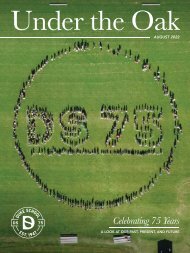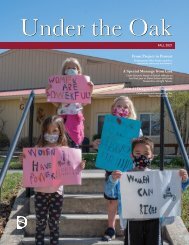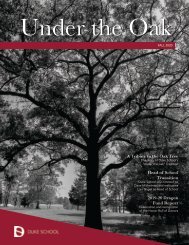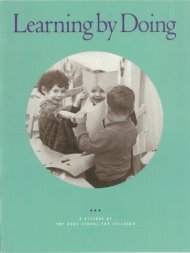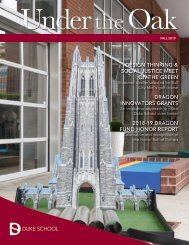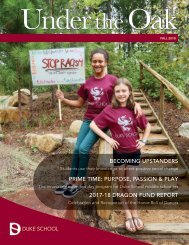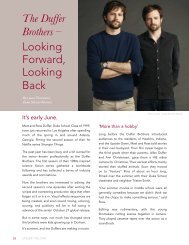Duke School's 2017-2022 Strategic Plan
You also want an ePaper? Increase the reach of your titles
YUMPU automatically turns print PDFs into web optimized ePapers that Google loves.
Future orientation<br />
I nnovative approaches and students<br />
Results that are impactful<br />
Equity<br />
and justice
DUKE SCHOOL CORE VALUES<br />
WHAT WE DO<br />
Inspire learners to boldly and creatively shape their future.<br />
IDEAS WE LIVE BY<br />
Learner-Centered: Learners are the center of a dynamic and<br />
collaborative learning, inquiry and discovery process.<br />
Active Inquiry: Intellectual curiosity through project-based<br />
learning propels learners to explore multiple paths to creative<br />
solutions.<br />
Bold Thinkers: A deep love of learning and respect for our<br />
community forms bold, critical thinkers for life.<br />
WHY WE DO IT<br />
To prepare the next generation of problem solvers for our<br />
complex world.<br />
EXCELLENCE IN EDUCATION SINCE 1947
OPENING LETTER<br />
Dear <strong>Duke</strong> School Community Members,<br />
The Board of Trustees is proud to share our strategic vision for the next five years.<br />
The strategic plan is truly a blueprint for a bold future. The plan is the result of countless<br />
hours of work by volunteers and staff alike. The board wants to thank them all for both their<br />
work and commitment to the school. It is their input that has shaped our future.<br />
A few features of the plan are worth highlighting. First, it begins with a vision statement,<br />
our aspirational hopes for the future. <strong>Duke</strong> School will continue preparing our students<br />
for the next steps in their education while inculcating the self-awareness, competence<br />
and confidence to make positive contributions. Our students and the institution will be<br />
upstanders, committed to doing the right things. We will also increase our influence on<br />
education by expanding our work with other teachers. Finally, we will become a model of<br />
equity and justice.<br />
The strategic plan, known as FIRE, revolves around four key themes: Future sustainability,<br />
Innovation, Results that are impactful, and Equity and justice. FIRE has 14 strategies<br />
allowing both the board and staff to keep a keen focus on each step. Indeed, overseeing<br />
the implementation of the strategic plan will be a top priority of the board and the school’s<br />
leadership.<br />
We would also like to highlight one of our strategies. The strategic plan calls for us to<br />
explore avenues to provide excellent project-based education to students in grades 9-12.<br />
While this means the school will be exploring the potential of opening a high school or<br />
partnering with another institution to open a high school, it does not mean a <strong>Duke</strong> School<br />
high school is imminent. An in-depth exploration will determine our future course.<br />
As always, thank you for your support and love of <strong>Duke</strong> School.<br />
M.C. Ragsdale | Board of Trustees Chair<br />
Dave Michelman | Head of School
PLANNING FOR THE FUTURE<br />
Since its inception, <strong>Duke</strong> School has been a leader in progressive education and has excelled<br />
in preparing the next generation of problem solvers while inspiring learners to boldly and<br />
creatively shape their future. As the world around us changes at increasingly faster rates,<br />
our strategies to prepare students to thrive in this environment must evolve just as quickly.<br />
While the future our students will inherit is impossible to predict, we do know:<br />
• The complexity of challenges facing the world are outpacing current knowledge and<br />
strategies thus the world needs innovative people and solutions to address them.<br />
• In order to be inspired problem solvers, students need the skills and habits of mind to be<br />
engaged and make an impact in the knowledge economy.<br />
• Students are most likely to succeed in an increasingly global cultural and economic<br />
landscape if they enjoy an equitable and just environment.<br />
• In order for <strong>Duke</strong> School to continue to be successful it needs a future orientation.<br />
• The world needs engaged active citizens who are upstanders.<br />
As a result, <strong>Duke</strong> School’s strategic plan (“FIRE”) has four pillars. The plan:<br />
1) Boldly looks to students’, teachers’ and the institution’s future, rather than being tethered<br />
to the past.<br />
2) Fosters innovative students equipped to thrive in a volatile, uncertain, complex and<br />
ambiguous (VUCA) world.<br />
3) Challenges and prepares students and the institution to strive for impactful results.<br />
4) Strives to create and maintain an equitable and just culture.<br />
The four pillars of the plan create synergies that will lead to both <strong>Duke</strong> School and<br />
its students to be upstanders.
VISION STATEMENT <strong>2022</strong><br />
<strong>Duke</strong> School graduates are leaders who are prepared to excel in the next steps of their<br />
education and contribute productively to a global, knowledge economy. They exhibit the<br />
self-awareness, competence, and confidence to be upstanders by putting innovative ideas<br />
into action for the greater good.<br />
<strong>Duke</strong> School is recognized as a national leader in project-based education and design<br />
thinking and is impacting education by influencing non-<strong>Duke</strong> School educators.<br />
<strong>Duke</strong> School is a diverse community and a model for equity and justice for all students,<br />
families and employees.<br />
KEYWORDS<br />
DESIGN THINKING<br />
Design thinking is a methodology that was initially conceived by designers before they<br />
began creating a project. The process is now being used to address all types of problems,<br />
particularly ones that call for creative solutions. The process consists of solvers being<br />
empathetic, defining the problem, brainstorming a wide range of possible solutions,<br />
prototyping a number of them and testing them in the world.<br />
SERVICE LEARNING<br />
Service Learning allows students the opportunity to engage and partner with the community<br />
organizations and members. Service learning is a collaborative and reciprocal partnership<br />
between <strong>Duke</strong> School and the community organization which identifies with and has equal<br />
voice in the design and implementation of the service activity.<br />
UPSTANDER<br />
Upstanders are individuals who use their knowledge to affect positive social change.<br />
Upstanders stand in contrast to bystanders.
FUTURE ORIENTATION<br />
<strong>Duke</strong> School will ensure that it has the institutional capacity to fund future programmatic and<br />
physical expansions and will explore the feasibility of providing students the opportunity to<br />
continue a project-based education at the high school level.<br />
STRATEGY 1: <strong>Duke</strong> School needs to become more entrepreneurial. Hence, <strong>Duke</strong> School<br />
will aggressively pursue creating and expanding revenue-generating businesses that<br />
leverage its current personnel and physical assets.<br />
RESOURCES REQUIRED/INPUTS:<br />
• Determine which current assets lend themselves to revenue generating enterprises<br />
»»<br />
Understand market and current <strong>Duke</strong> School strengths<br />
• Create business plans to generate new revenue producing businesses<br />
• Rework current administrative structure to ensure a person with entrepreneurial<br />
experience and mindset is leading this charge<br />
ADDITIONAL FINANCIAL RESOURCES REQUIRED:<br />
No immediate needs. As businesses thrive, more personnel may be needed.<br />
STRATEGY 2: <strong>Duke</strong> School realizes that there are a limited number of local high school<br />
options and none of them are project-based. Thus, <strong>Duke</strong> School will explore providing<br />
excellent project-based instruction for grades 9-12 by investigating the practicality and<br />
advantages of starting a high school, either independently or in collaboration with an<br />
innovative partner.<br />
RESOURCES REQUIRED/INPUTS:<br />
• Determine needs for a high school and develop the relevant specifics<br />
»»<br />
Understand market<br />
»»<br />
Determine needs for the school<br />
»»<br />
Determine potential for a partner<br />
• Once plan is conceived, study the practicality of creating a high school<br />
ADDITIONAL FINANCIAL RESOURCES REQUIRED:<br />
Hiring of a consultant.
STRATEGY 3: <strong>Duke</strong> School should be able to expand its program and physical footprint<br />
to meet future strategic initiatives. Hence, <strong>Duke</strong> School will develop a comprehensive land<br />
use strategy and explore the need for securing a large tract of contiguous or nearby land.<br />
RESOURCES REQUIRED/INPUTS:<br />
• Develop land use and facilities master plan to determine land needs<br />
• Grant explicit authority for the Head of School to negotiate a land deal on<br />
behalf of <strong>Duke</strong> School with support from the Board Finance Committee<br />
ADDITIONAL FINANCIAL RESOURCES REQUIRED:<br />
Create reserve to buy land.<br />
STRATEGY 4: To secure its future, <strong>Duke</strong> School must ensure it has enough income<br />
to meet its strategic goals. Hence, <strong>Duke</strong> School needs to determine a long-term<br />
affordability plan.<br />
RESOURCES REQUIRED/INPUTS:<br />
• Board of Trustees to determine tuition-setting objectives<br />
• Hire a consultant to advise on affordability price points in our market<br />
• Board Finance Committee recommends affordability strategy<br />
ADDITIONAL FINANCIAL RESOURCES REQUIRED:<br />
Hire a consultant to study demographics of <strong>Duke</strong> School’s market area.
INNOVATION<br />
Recognizing that students will require additional skills and habits of the mind to ensure they<br />
can confront the complexity of challenges of the ever evolving global knowledge economy,<br />
<strong>Duke</strong> School will appropriately grow and augment its project-based learning approach to<br />
prepare our students to become inspired problem solvers of the future.<br />
STRATEGY 1: Students need to understand the best processes for being innovative.<br />
Hence, <strong>Duke</strong> School will enhance its project-based curriculum so that students explicitly<br />
understand and employ design thinking.<br />
RESOURCES REQUIRED/INPUTS:<br />
• Dedicate programmatic/curricular staffing resources for internal innovation<br />
• Work with teachers to integrate design thinking into project work<br />
• Hire outside design thinking professional development consultants to work with faculty<br />
STRATEGY 2: To be innovative, particularly in the long run, <strong>Duke</strong> School students and<br />
employees need to be self-aware and be able to take care of themselves. Because students<br />
and adults are bombarded with electronic distractions and temptations, they need a strong<br />
set of self-regulation and technology management skills. Hence, <strong>Duke</strong> School will implement<br />
a self-care curriculum and employee initiative.<br />
RESOURCES REQUIRED/INPUTS:<br />
• Create a schoolwide self-care curriculum which integrates self-care into the social<br />
curriculum<br />
• Hire a Lower School counselor who, along with the Middle School counselor, will oversee<br />
the self-care curriculum<br />
ADDITIONAL FINANCIAL RESOURCES REQUIRED:<br />
Funds to hire a Lower School counselor.<br />
STRATEGY 3: Middle School students need to be able to explore their passions in low<br />
risk environments. Hence, <strong>Duke</strong> School will extend the Middle School day to 6 PM (with the<br />
3:30-6 PM time being optional) to allow students to explore a variety of activities.<br />
RESOURCES REQUIRED/INPUTS:<br />
• Securing additional program offerings to enhance after school experience<br />
ADDITIONAL FINANCIAL RESOURCES REQUIRED:<br />
Hire program experts by fall 2018. Increase tuition or fees to cover additional costs.
STRATEGY 4: Students need a place to create, innovate and perform. In addition, <strong>Duke</strong><br />
School needs a flexible space to house entrepreneurial endeavors, host community events<br />
and teacher institutes. Hence, <strong>Duke</strong> School will explore building an innovation lab featuring<br />
flexible space.<br />
RESOURCES REQUIRED/INPUTS:<br />
• Determine needs for an innovation lab and develop the relevant specifics<br />
• Hire an architect to help design building<br />
• Hire consultant to do a feasibility fundraising study<br />
ADDITIONAL FINANCIAL RESOURCES REQUIRED:<br />
Hire architect and a fundraising consultant.
RESULTS THAT ARE IMPACTFUL<br />
In addition to understanding how to be problem solvers, <strong>Duke</strong> School will also prepare<br />
students to be upstanders - to use their knowledge to affect positive social change.<br />
Additionally, <strong>Duke</strong> School will strive to continue to be a national leader in project-based<br />
education and will expand the current teacher training institutes so as to affect and support<br />
the next generation of educators.<br />
STRATEGY 1: To be impactful, a student needs to see that their actions and work can<br />
drive positive change in their world. Hence, each year students will experience being an<br />
upstander either through project work, service learning, or both.<br />
RESOURCES REQUIRED/INPUTS:<br />
• Dedicated programmatic/curricular professional development focused on how to<br />
transform a number of projects into being more community oriented<br />
• Work to integrate design thinking into project-based learning<br />
STRATEGY 2: To be impactful, a student needs to understand the needs of the greater<br />
community and that their work can make the world better through reciprocal collaborations<br />
with community agencies and members. Hence, the school will improve and standardize its<br />
service learning for grades K-8.<br />
RESOURCES REQUIRED/INPUTS:<br />
• Rededication of staff to identify community partners who are willing to work in<br />
partnership with the school<br />
STRATEGY 3: To be impactful to the broader education landscape, <strong>Duke</strong> School needs<br />
to teach other teachers how to become excellent project teachers. Hence, <strong>Duke</strong> School<br />
will grow enrollment in its teacher institutes, particularly for teachers working with a wide<br />
range of socioeconomic students, consult at other schools, and publish multimedia materials<br />
describing its teaching approach.<br />
RESOURCES REQUIRED/INPUTS:<br />
• Train additional <strong>Duke</strong> School Project Trainers<br />
• Determine timeline for publishing multimedia material<br />
ADDITIONAL FINANCIAL RESOURCES REQUIRED:<br />
Staffing support for marketing.
EQUITY AND JUSTICE<br />
The <strong>Duke</strong> School community is committed to being a model for equity and justice for all<br />
students, families, educators and employees. We strongly believe that students are most likely<br />
to succeed in an increasingly global cultural and economic landscape if they experience an<br />
equitable and just environment. For <strong>Duke</strong> School to become equitable and just, all constituencies<br />
must understand and appreciate the tapestry of humankind, understand that diversity leads to<br />
better decisions, and that equity and justice for all racial, ethnic, religious groups, and LGBT<br />
community members is a moral imperative.<br />
STRATEGY 1: <strong>Duke</strong> School recognizes that some barriers to becoming more diverse,<br />
equitable and just may be systemic, unconscious, or cultural and thus difficult for members of the<br />
<strong>Duke</strong> School community to recognize and change. <strong>Duke</strong> School will work to identify and change<br />
those systemic barriers.<br />
RESOURCES REQUIRED/INPUTS:<br />
• Hire a consulting firm to begin in the <strong>2017</strong>-18 school year, to advise us on and make<br />
recommendations about <strong>Duke</strong> School practices that would break down systemic barriers and<br />
make us more equitable and just<br />
ADDITIONAL FINANCIAL RESOURCES REQUIRED:<br />
Consulting contract, and additional personnel if required.<br />
STRATEGY 2: For <strong>Duke</strong> School to create an equitable and just culture, employees, board<br />
members and parents should have a deep understanding of systemic racism. Hence, <strong>Duke</strong> School<br />
will require that all members of the board and all employees attend racial and equity training and<br />
will offer training to all parents who wish to participate.<br />
RESOURCES REQUIRED/INPUTS:<br />
• Hire training consultants<br />
ADDITIONAL FINANCIAL RESOURCES REQUIRED:<br />
Cost of employee training and scholarships for board and parents.<br />
STRATEGY 3: For <strong>Duke</strong> School to be truly just and equitable, it must meet the needs of a<br />
wider socioeconomic spectrum. Hence, <strong>Duke</strong> School will commit to extending its socioeconomic<br />
reach through expanded summer programing and working with teachers who teach a wide<br />
socioeconomic range of students. The school will determine how or if it can meet the needs of a<br />
wide range of socioeconomically diverse students in its core academic year program.<br />
RESOURCES REQUIRED/INPUTS:<br />
• Revisiting Indexed Tuition philosophy<br />
• Scholarships to Teacher Institutes for teachers working with a broad range of<br />
socioeconomic children<br />
ADDITIONAL FINANCIAL RESOURCES REQUIRED:<br />
Increased Indexed Tuition dollars and monies dedicated to summer programs.
SPECIAL THANKS TO OUR TASKFORCE MEMBERS<br />
STEERING<br />
COMMITTEE<br />
Kathy Bartelmay<br />
Kisha Daniels<br />
Christopher Gergen<br />
Dave Michelman<br />
M.C. Ragsdale<br />
Mark Scullion<br />
Connie Semans<br />
Julie Shermak<br />
Tina Valdecanas<br />
PREPARING STUDENT<br />
AGENCY<br />
Jenny Murray (Chair)<br />
Meytal Barak<br />
Kristin Bradley Bull<br />
Katie Christo<br />
Heather Clarkson<br />
Stephen Cole<br />
Maureen Dwyer<br />
Matthew Etherington<br />
Gabe Hart<br />
Sheronda Jeffries<br />
Romina Khandani<br />
Beth Murgitroyd<br />
Willie Nicholson<br />
Connie Semans<br />
Cassandra Taylor<br />
Rachel Wertheimer<br />
INSTITUTIONAL<br />
SUSTAINABILITY<br />
Jeff Welty (Chair)<br />
Kenneth Chandler<br />
Annie Gentithes<br />
Richard Griffin<br />
Lisa Andrews-Lanier<br />
Shahar Link<br />
Frances Mock<br />
Gary Monroe<br />
Kendra Maultsby-Mudd<br />
Dana Pearsall<br />
Russell Rabinowitz<br />
Rachel Wertheimer<br />
NEIGHBORHOOD<br />
ENGAGEMENT<br />
Elizabeth Hays (Chair)<br />
Grace Beason<br />
Elaine Cameron<br />
Elise Dunzo<br />
Louise Flynn<br />
Victoria Goatly<br />
Lisa Kahan<br />
Sarah Lamb<br />
Joel Lipsitch<br />
Lake Lloyd<br />
Julie Marshall<br />
Whitney Sandor<br />
Bob Robinson<br />
Emeline Van Deman<br />
Tina Valdecanas<br />
Les Webster<br />
EDUCATION EXPERTS<br />
Nicole Thompson (Chair)<br />
Natalie Aho<br />
Kathy Bartelmay<br />
Katie Christo<br />
Kisha Daniels<br />
Leah Houde<br />
Carolynn Klein<br />
Amy Lau<br />
Ann Lawrence<br />
Mark Scullion<br />
Connie Semans<br />
Les Webster<br />
Alison Windram<br />
ADMINISTRATIVE<br />
SUPPORT<br />
Kristi Martin


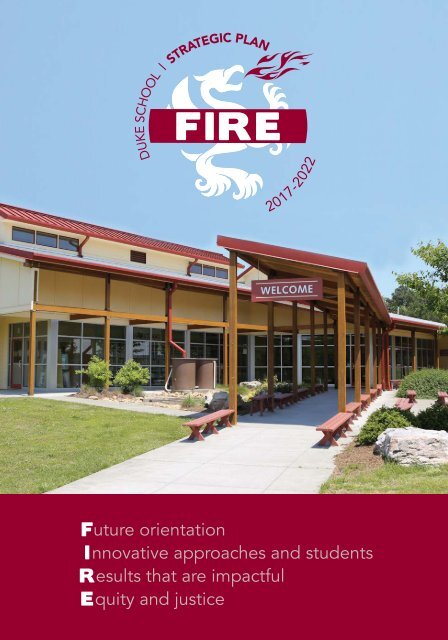

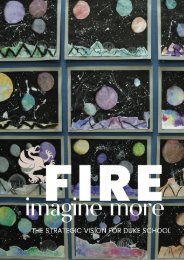
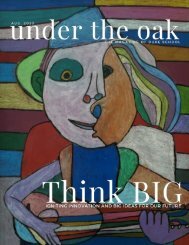
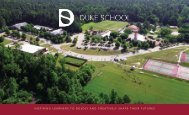

![Under the Oak 2023 [FINAL5] (1)](https://img.yumpu.com/68405392/1/190x245/under-the-oak-2023-final5-1.jpg?quality=85)

